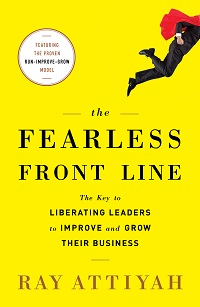 Guest blog by Ray Attiyah, excerpted from his new book, The Fearless Front Line: The Key to Liberating Leaders to Improve and Grow Their Business. (2013 Bibliomotion, used with permission)
Guest blog by Ray Attiyah, excerpted from his new book, The Fearless Front Line: The Key to Liberating Leaders to Improve and Grow Their Business. (2013 Bibliomotion, used with permission)
Much of our time is spent working— some forty, sixty, even eighty hours per week. That’s more time awake than we spend with our friends or family and rivals the time we spend sleeping. Shouldn’t the time we spend at work be worth it? Shouldn’t that time be filled with a sense of purpose and accomplishment and not just packed with appointments and never- ending task lists? Shouldn’t we be energized by the efforts and successes of our work team rather than drained by them?
Most, if not all, of us wouldn’t hesitate to answer those questions with a resounding “YES!” That’s because, deep down, we believe work should be more than just getting through a daily task list, checking off items as we finish them. Work should be a place that builds energy, not drains it. Work should provide opportunities for growth and improvement that bring out the best in us as individuals, as teams, and as entire organizations.
Too often, however, work isn’t like that at all. Instead of energizing us, it traps us. Instead of inspiring us, it dulls our senses. The workplace is full of bureaucracy and negative complexity.
Some companies shine like beacons of excellence and growth in the crowded market. So, what’s the difference between those companies that shine and the ones where work is a slog, apathy is everywhere, and products and people are mediocre at best?
|
"To compensate for their lack of confidence in the Run, managers become conditioned to overmanage and underlead. So, while they are stuck in the front line, they’re not leading or pursuing activities that propel growth and innovation.” |
The key is in liberating leaders. In companies where complicated systems reign, nearly everyone has his hands in the daily details of producing the product or delivering the services. Managers and frontline employees (and top executives and sometimes even the CEO) are tangled up in running the day-to-day aspects of the business, or the Run. The frontline activities are so unpredictable, unreliable, and complicated, and the systems surrounding them are so often superfluous, that managers can’t seem to pull themselves away. (As you can imagine, this situation frustrates managers and employees alike.) Time and energy are consumed by urgent but unimportant tasks rather than activities that produce sustained personal and organizational growth. Managers have difficulty forgetting bad situations, and that inability to let go shakes their confidence in their frontline team and its activities.
To compensate for their lack of confidence in the Run, managers become conditioned to overmanage and underlead. Regaining confidence is an uphill fight. So, while managers are stuck in the front line, they’re not leading or pursuing activities that propel growth and innovation.
A Fearless Front Line
The precondition for liberating managers is having a front line that can operate reliably, excellently, and independently day in and day out every day of every week of every year. The Run needs to be rock solid— perpetually. It’s the foundation of the entire organization. Yet, at the same time that the Run needs to be solid, it can’t be rigid. It also needs to evolve and transform as the company innovates and grows. A Run like that involves getting the entire company, and particularly the front line, to be fearless. The front line needs to feel powerful, not powerless. It needs to be freed from worrying about senseless initiatives, ridiculous mandates, and unnecessary meetings and e-mails. It needs to be trusted, encouraged, and accountable to itself. It needs to be emboldened.
Think of the daily provisions that we add because we lack confidence and trust in flawless Run execution:
- Extra meetings
- Check-up e-mails
- Unnecessary conference calls
- Detailed Reports
- Useless measurements and data colelction
- Audits
- E-mail distribution lists
- Repeated e-mail chains
- Emergency phone calls
- Sign-off requirements
- Approval restrictions
- Additional systems, procedures and processes
Clutter is a compromise; it’s a response to the unreliable nature of our frontline Run. When the Run doesn’t operate consistently at peak performance, we compensate by adding layers of systems and processes.
How Do You Develop a Fearless Culture in the Run?
Surmounting the impediments to creating a fearless culture in the Run isn’t as difficult as you might be thinking. There are three very practical ways to shape the leadership culture you want to pervade the Run:
- Raise the bar of excellence by investing in top performers and removing obstacles that frustrate them.
- Foster quick-win successes by removing frustrations and making meaningful changes quickly to bolster team confidence, enthusiasm, and trust.
- Implement daily huddles to foster a positive "what went well” environment, communicate your standards of performance, and create a simple touch point for communicating status of reactive improvements.
Keep it simple, and be fearless!
The Fearless Front Line - The Key to Liberating Leaders to Improve and Grow Their Business from The Fearless Front Line on Vimeo.

Written by Martha Heller
Martha Heller is a widely followed technology talent thought leader and the CEO of Heller, a specialized technology executive search firm for the data economy. Martha is the author of two books which have shaped the technology talent discussion: Be the Business: CIOs in the New Era of IT, and The CIO Paradox: Battling the Contradictions of IT Leadership.



